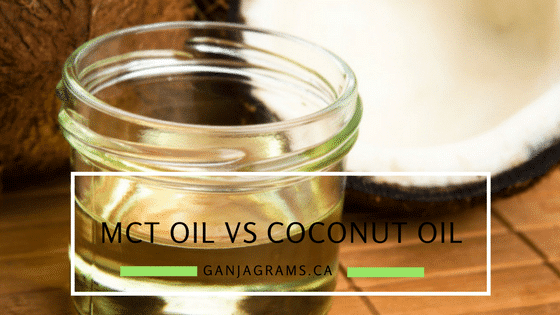What is MCT Oil?
It’s a medium-chain triglyceride, a form of saturated fatty acid that has numerous health benefits from improving your cognitive functions to weight management.
Medium-chain triglycerides are a kind of fat particle found in coconut oil and palm oil. Studies reveal that MCT Oil benefits can protect our bodies from viral infections, which means no more colds!
What is Coconut Oil?
Coconut Oil, on the other hand, has one of the great sources of MCTs- roughly 62-65% of fatty acids.
MCFAs is the other term for MCTs stands for medium-chain fatty acids. That is believed to be hugely missing from diets consumption aka “Standard Western” diets. It is believed that all forms of saturated fats are potentially harmful to humans. But, on recent research shows a lot of evidence about the statured fats.
Ideally, consumers need to consume coconut oil on daily basis. MCTs and other healthy fats can be found in things like coconut oil or graff-fed beef that are easier to digest than long-chain triglycerides( LCTs)
Traditional populations that are living in tropical areas have been consuming saturated fats, including with MCTs like coconuts. A low-fat diet is “healthy” turns out to be the biggest lies on nutrition list.
MCT Oil vs Coconut Oil: Which is Better?
MCT Oil and Coconut Oil differences are that MCT oil is more concentrated and contains different proportions of MCTs whole Coconut oil only has a portion of MCTs in it.
Many studies show that Coconut oil is one of the best sources of Lauric Acid which has antibacterial, antimicrobial and antiviral properties. 90% of the fats that are found in coconut oil is saturated with a high percentage is not short chain MCTs that have fewer carbons.
Coconut oil and MCT oil manufacturers are legally allowed to claim that lauric acid is a type of MCT. Some people claim that lauric acid doesn’t biologically act like other forms of shorter MCTs, which is one reason why MCT advocates believe that MCT oil is superior.
Where to find MCTs?
Other than coconut, MCTs can be found in butter (especially grass-fed cows), cheese (who doesn’t love cheese?? I do love it!) Whole milk, Palm Oil and full-fat yogurt.
Why are MCT Oils Special?
MCTs are easily digested and sent directly to our liver, where they have a thermogenic effect and ability to alter metabolism. Some people consider it as a “fuel” or energy to the body instead as fats.
All types of fatty acids are made up of strings connected carbon and hydrogen. Short-chain fats are categorized by how many carbons they have. Fewer than six carbons, the medium-chain fats have 6-12 carbons and long-chain fats (example: Omega-3s) have 13-21.
LCTs vs MCTs?
MCTs can be easily absorbed compare to LCTs since there is less work for the body to digest and break apart the carbon bonds. MCTs are smaller than LCTs which makes them easy to permeate our cells membranes and doesn’t require to use enzymes for our body to utilize.
Benefits of MCTs
- Reduce risk of low-fat diets
- Gut Environment(combat harmful bacteria eg. viruses and parasites)
- Contains Antioxidant Properties (inflammatory benefits to treat health problems for centuries)
MCFAs Benefits for your Body:
- Maintain Healthy Weight
- Provides more energy
- Ease your mind
- Reduce Stored Body fats
- Helps with your Digestions
- Balances your hormone levels
- No more mood swings- it helps improve your mood
- Fight against bacterial infections and viruses
- Absorbs fats -soluble to nutrients from various foods
4 Different Kinds of MCTs:
The less number of carbons the acid has. ( Carbon<Acid) The faster your body can turn those fatty acids into usable energy, called ketones.
- Caproic Acids (C6:0)
- Caprylic Acids (C8:0)
- Capric Acids (C10:0)
- Lauric Acids (C12:0)
Nutrition Facts of MCTs
It doesn’t matter what kind of MCT, all are beneficial for our overall health, especially for people who have the difficulty of digesting other forms of fats including with malabsorption problems and digestive disorders like leaky gut syndrome and gallbladder infections, etc.
What is Ketones?
Ketones are what our body produces when it is using fats for energy instead of glucose.
MCT oil might also remove some of the very beneficial lauric acid, which is the star ingredient in real extra-virgin coconut oil. In order to produce a liquid MCT oil that does not become solid at colder temps, it might need to be more refined than regular coconut oil.
Filler Oils like omega-6 polyunsaturated fats are commonly present in MCT by marketers of MCT oil. It’s mostly manufactured using chemical/solvent refining in which they can require it using chemicals like hexane and enzymes and combustion chemicals.
Conclusion:
Make sure you purchase a high-quality MCT Oil that is ingredients are clearly written and how it was produced. Other than that, you can enjoy both MCT Oil and Coconut Oil.
[/vc_column_text][/vc_column][/vc_row]


Pingback: Things You Need to Know About MCT Oil | Male Health Clinic
Pingback: MCT oil – Darlene Rose